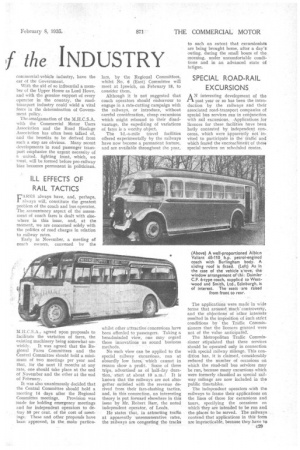ILL EFFECTS OF RAIL TACTICS
Page 91

If you've noticed an error in this article please click here to report it so we can fix it.
FARESways always have, and, perhaps, al will, constitute the greatest problem of the coach and bus operator. The accountancy aspect of the assessment of coach fares is dealt with elsewhere in this issue, and, at the moment, we are concerned solely with the politics of road charges in relation to railway rates. Early in November, a meeting of coach owners, convened by the M.H.C.S.A., agreed upon proposals to facilitate the variation of fares, the existing machinery being somewhat un wieldy, It was agreed that the Regional Fares Committees and the Central Committee 'should hold a minimum of two meetings per year and that, for the next 12 months at any rate, one should take place at tha end of November and the other at the end of February. It was also unanimously decided that the Central Committee should hold a meeting 14 days after the Regional Committee meetings. Provision was made for holding emergency meetings and for independent operators to defray 50 per cent, of the cost of meetings, These and other proposals have been approved, in the',, main particu lars, by the Regional Committees, whilst No. 6 (East). Committee will meet at Ipswich, on February 18, to consider them. Although it is not suggested that coach operators should endeavour to engage in a rate-cutting campaign with the railways, or introduce, without careful consideration, cheap excursions which might rebound to their disadvantage, the expediting of variations of fares is a worthy object. The Id -a-mile travel facilities offered experimentally by the railways have now become a pernianent feature, and are available throughout the year, whilst other attractive concessions have been afforded to passengers. Taking a broadminded view, one may• regard these innovations as sound business
methods. ' •
No such view can be applied to the special railway excursions, run at absurdly low fares, which cannot in reason show a profit. Some of these trips, advertised as of half-day duration, start at about 10 a.m.! It is known that the railways are not altogether satisfied with the revenue derived from their fare-slashing tactics, and, hi this connection, au interesting theory is put forward elsewhere in this issue by Mr. Robert Barr, the noted independent operator, of Leeds. that, in attracting
He states traffic
at apparently unremunerative rates, the railways are congesting the tracks to such an extent that excursionists are being brought home, after a day's outing, during the small hours of the morning, under uncomfortable conditions and in an advanced state of fatigue.














































































































































































